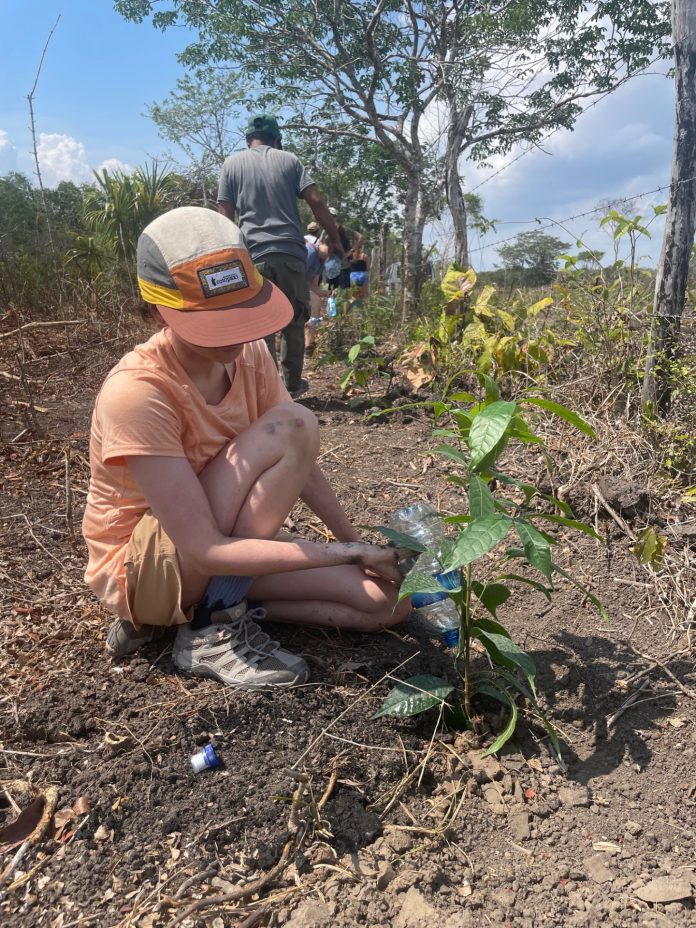For students from Southern Connecticut State University’s Biology Department, a recent study abroad trip to Belize offered more than just an educational experience — it was a journey of personal and professional transformation.
Led by Dr. Miranda Dunbar, assistant professor of biology, the course, BIO 327: Natural Field History, aimed to provide students with an immersive field experience in wildlife biology and field research. Biology majors Nathan Trumbley, Santi Arounsack-Colon, and Colleen Kelley shared their unique experiences and insights from the 10-day adventure.
Discovering Belize: A First-Time Traveler’s Perspective
For Trumbley, the trip marked his first journey outside the United States. “It took probably half the trip until I accepted that it was actually happening,” Trumbley recalled. “Visiting the jungle was very surreal.”
From the moment the students stepped off the plane, the differences between Connecticut and Belize were striking. “The terrain and wildlife were wildly different from what we have in the United States,” Trumbley noted. “In Belize, half the country is jungle, and they also have grasslands, savannahs, and coral reefs. The cultural diversity was also fascinating, with many people speaking multiple languages.”
Kelley, a junior biology major and journalism minor, was particularly drawn to the hands-on experience with wildlife. “I want to go into environmental awareness to the public,” she said. “So going down to Belize, and serving like the crocodiles and the bats, like hands-on experience with the animals, that was so cool. And that was exactly what I want to be doing when I’m older.”
An Unexpected Opportunity: Reforestation Project
One of the highlights of the trip was an unexpected reforestation project at the Lamanai Archaeological Reserve. Initially not part of the program, the project became a transformative experience for the students. “It was a surprise, but when Dr. Dunbar asked if we wanted to participate, we all eagerly agreed,” said Arounsack-Colon.
The students spent a hot day planting trees, watering them, and spreading seeds on deforested farmland. “It was shocking to see the diversity of seeds we planted,” Arounsack-Colon said. “It’s hard to see the immediate reward, but you can imagine what it will look like in the future.”
The impact of their work was not immediately visible, but the appreciation from the local community made a significant impression. “Even though in the moment it felt like we were just throwing seeds around, hearing all the thanks and appreciation made us realize the true impact of our efforts,” Trumbley added.
Immersive Field Research
The trip also included intensive field research activities, such as capturing and studying bats and crocodiles. “We measured the health of the Morelet’s crocodile and relocated bat species that had invaded our cabins,” Arounsack-Colon explained. They also set up camera traps, capturing images of rare species like the coati.
Adaptability was a key lesson learned during the trip. “In the field, you have to be adaptable,” Arounsack-Colon emphasized. “You need to change your methods based on outcomes you can’t control, whether it’s the weather or the presence of animals.”
Looking Ahead: Career Aspirations
The Belize trip solidified all three students’ aspirations to pursue careers in wildlife biology. “This trip wasn’t just a fun visit to a tropical place; it showed me a future career in wildlife biology,” Trumbley said.
Arounsack-Colon, too, found clarity in his career goals. “I want to get into wildlife studies and travel to study nature. This trip was a perfect fit for stepping into that world,” he said.
Kelley, who balances her biology major with a minor in journalism, found the trip particularly relevant to her goals. “I want to go into environmental awareness to the public. This trip was exactly what I want to be doing when I’m older.”
She offers advice for students considering studying abroad. “Find an abroad program that has something to do with your interests because if you’re interested in it, and you go, it’s going to be ten times better. There’s no chance for you to regret it.”


